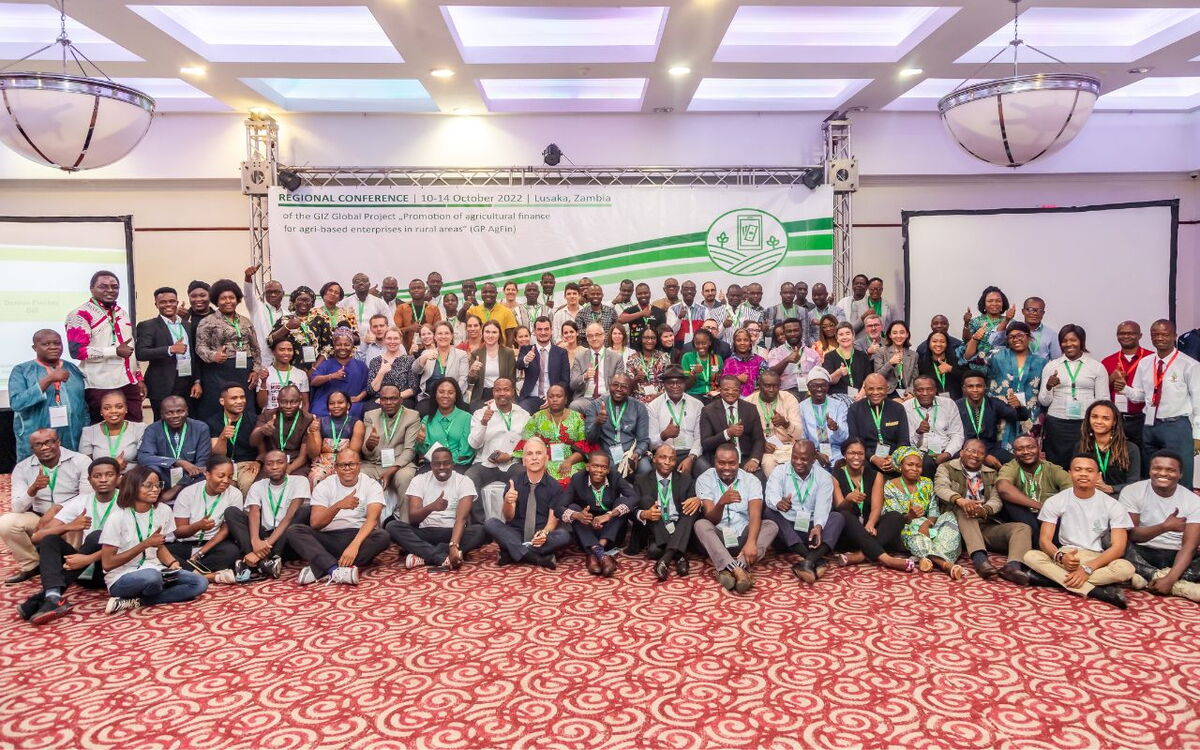Newsletter
Don't miss a thing!
We regularly provide you with the most important news, articles, topics, projects and ideas for One World – No Hunger.
Newsletter
Don't miss a thing!
We regularly provide you with the most important news, articles, topics, projects and ideas for One World – No Hunger.
Please also refer to our data protection declaration.
Data security, financing, the automation of loans and the use of alternative data - the digitalisation of financial services in the agricultural sector has many facets, which an international conference with representatives of the agricultural finance sector in Zambia addressed. But how does the digitalisation of financial services contribute to rural development and the inclusion of women?

Multiple crises, climate extremes and the ongoing pandemic have intensified the global food crisis in recent years. Currently, up to 828 million people worldwide suffer from hunger. In many African countries, agriculture is fundamental to economic development and thus of great importance in the fight against poverty and hunger. Over 50 percent of the African population is engaged in this sector. However, most agricultural and agri-based businesses have little market orientation and are hardly integrated into the cash economy.
Banks and financial institutions are mainly concentrated in urban areas. Despite progress in the past 20 years, there are few financial services adapted to the needs of farmers.
These include, for example, seasonal conditions, such as the availability of loans adapted to the planting season, as well as weather risks and associated uncertainties and corresponding insurance, such as weather index insurance. This lack of rural inclusion inhibits or prevents investment in agriculture-based value chains.
On the one hand, they enable financial institutions to better access rural areas and more easily adapt financial services to the needs of the agricultural sector. On the other hand, they offer the rural population the opportunity to spare themselves long journeys and high transaction costs. However, this presupposes that the necessary digital infrastructure is already in place.
Mobile money in particular has become an important factor for sustainable financial inclusion. The World Bank's Global Findex Database 2021 notes that ownership of accounts at a bank or regulated institution, such as a credit union, microfinance institution or mobile money service provider, has increased by 50 percent globally over the past 10 years. In sub-Saharan Africa, an increase in accounts is largely due to the introduction of mobile money.
Digital applications are also being used to develop alternative credit scores. As Nathan Were, agri-business advisor at the World Bank explains, the best guide to assessing creditworthiness is a client's repayment history. But this is a dilemma, because if a potential borrower cannot access credit, he cannot build a credit history. The collection and evaluation of "alternative data", such as mobile data usage behaviour, can help to assess creditworthiness even without a bank history.
These and other topics, such as data security, financing, the automation of loans, skills development of staff, a critical questioning of data analyses and the use of alternative data in agricultural financing were dealt with in depth at the international conference in Lusaka. The global project "Promotion of Agricultural Finance for Agri-based Enterprises in Rural Areas" (GV AgFin) commissioned by the German Federal Ministry for Economic Cooperation and Development (BMZ) and implemented by the Gesellschaft für Internationale Zusammenarbeit (GIZ), organised this in October 2022 on the topic of "Digitalising Agricultural Finance". The event was mainly attended by representatives of financial institutions from nine sub-Saharan African countries. Together, they addressed the questions of how digital strategies in the agricultural finance sector need to be refined and new digital applications integrated to be able to offer a comprehensive range of financial services in rural areas.
The inclusion of the rural population in general and that of women in particular received special emphasis. Women often have limited or no access to digital devices, know-how, and services. Other barriers to setting up a mobile account are lack of knowledge about mobile money and financial skills in general.
By adapting financial services for women and their multiple needs, such as the provision of group loans, low-threshold loans, alternative collaterals, the consideration of und appropriate reaction to social norms, and digital literacy trainings, the risk of unintentionally discriminating against women through digitalisation can be counteracted.
One example of the digital integration of rural women into the agricultural finance sector is the microfinance institution MicroLoan Foundation (MLF), with which the GV AgFin cooperates in Malawi. MLF gears its financial products exclusively to the needs of women farmers. The aim is to enable them to end the cycle of poverty. To this end, MLF offers training in business and financial skills in combination with the provision of needs-based loans. Financial services developed in partnership with GV AgFin include, for example, working capital loans for female rice, soybean, and groundnut producers. The combination of credit and mobile money for disbursements and repayments spares the women the long and often dangerous journey to the few branches in rural Malawi.
In the following interview, Joseph Kaipa, deputy CEO at MLF explains why MLF works specifically with women, what concrete measures are being taken to integrate women into the agricultural financial sector, and why digital financial services are an appropriate tool to support rural women. Finally, he elaborates on the achievements. With the support of AgFin, training and coaching methods specialised in agricultural finance were carried out with the staff and clients. The result is a loan repayment rate of 98 percent.
Farmers from Zambia, Malawi and Burkina Faso illustrate in the following video how digital financial services, can contribute to the development of rural areas. References to poor internet connections or missing product information make it clear that the digital transformation of the agricultural sector is still ongoing. However, the success stories show that digitalisation can contribute to rural development, although special care must be taken to ensure that women and marginalised groups are not left behind.